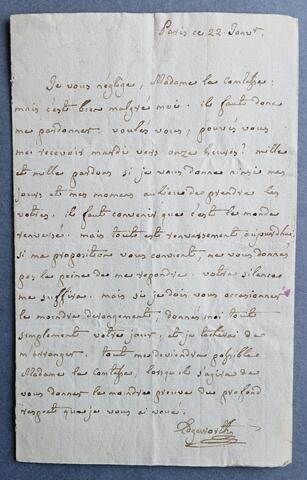Reference code
Title
Date(s)
- [c.1790-1800] (Creation)
Level of description
Extent and medium
1 p.; manuscript
Name of creator
Repository
Archival history
Immediate source of acquisition or transfer
Scope and content
A letter from Abbé Henry Essex Edgeworth, Paris, to the [Comtesse du Roure].
Appraisal, destruction and scheduling
Accruals
System of arrangement
Conditions governing access
Conditions governing reproduction
Language of material
- French
Script of material
Language and script notes
Physical characteristics and technical requirements
Finding aids
Existence and location of originals
Existence and location of copies
Related units of description
Note
For biographical information on Abbé Henry Essex Edgeworth (1745-1807) see https://www.dib.ie/biography/edgeworth-de-firmont-abbe-henry-essex-a2885
Note
Born in County Longford, Edgeworth is known to history as the confessor to Louis XVI, the last King of France before the fall of the monarchy during the French Revolution. He accompanied Louis to the scaffold before his execution by guillotine on 21 January 1793. Edgeworth was a distant relation of the celebrated novelist Maria Edgeworth (1768-1849). He was educated by the Jesuits and trained for the priesthood in Toulouse in France. Upon his ordination he took the name de Firmont, from his father’s estate of Firmount near Edgeworthstown in County Longford. This was likely due to his surname being too difficult to pronounce in French. He is known as Abbé de Firmont in France, but in English-language sources, he is generally referred to as Abbé Edgeworth.
He was Vicar-General of the Diocese of Paris and was appointed confessor to King Louis XVI’s sister, Elizabeth, in 1791. It was she who recommended Edgeworth to Louis as the revolution engulfed his realm. Following Louis’ condemnation to death, Edgeworth was able to obtain permission to celebrate Mass for him and to attend him at his execution. Legend ascribes to him the expression ‘Fils de Saint Louis, montez au ciel’ (‘Son of Saint Louis, ascend to heaven’) as the King was beheaded. However, his utterance of this phrase was later disputed, and it is likely that the words were merely attributed to him at a later date. Edgeworth subsequently went into hiding and although he considered returning to Ireland, he remained loyal to the now exiled French court. He died while ministering to French soldiers at Mittau in Russia (now Jelgava, Latvia) on 22 May 1807.

